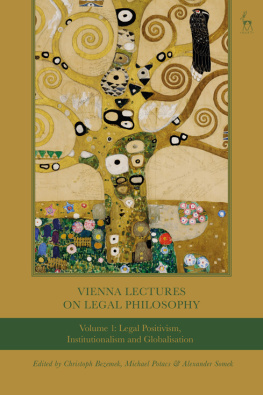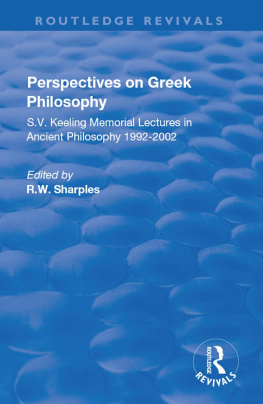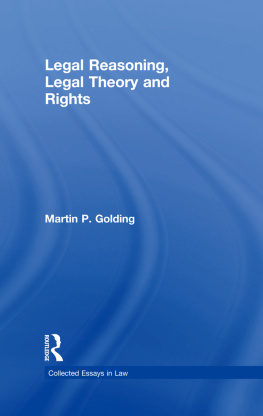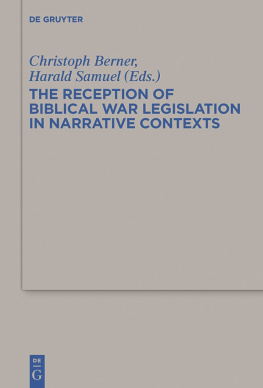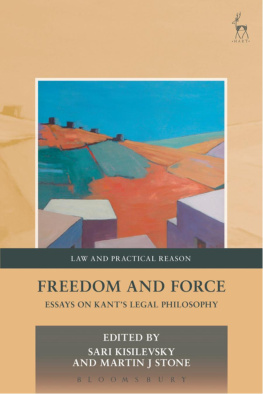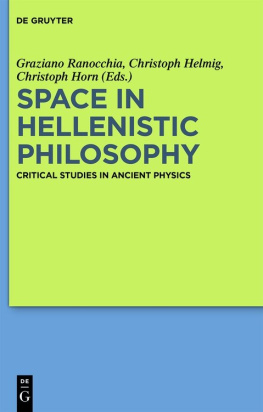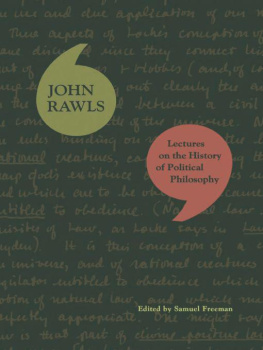Christoph Bezemek - Vienna Lectures on Legal Philosophy, Volume 1
Here you can read online Christoph Bezemek - Vienna Lectures on Legal Philosophy, Volume 1 full text of the book (entire story) in english for free. Download pdf and epub, get meaning, cover and reviews about this ebook. year: 2018, publisher: Bloomsbury UK, genre: Politics. Description of the work, (preface) as well as reviews are available. Best literature library LitArk.com created for fans of good reading and offers a wide selection of genres:
Romance novel
Science fiction
Adventure
Detective
Science
History
Home and family
Prose
Art
Politics
Computer
Non-fiction
Religion
Business
Children
Humor
Choose a favorite category and find really read worthwhile books. Enjoy immersion in the world of imagination, feel the emotions of the characters or learn something new for yourself, make an fascinating discovery.
- Book:Vienna Lectures on Legal Philosophy, Volume 1
- Author:
- Publisher:Bloomsbury UK
- Genre:
- Year:2018
- Rating:3 / 5
- Favourites:Add to favourites
- Your mark:
- 60
- 1
- 2
- 3
- 4
- 5
Vienna Lectures on Legal Philosophy, Volume 1: summary, description and annotation
We offer to read an annotation, description, summary or preface (depends on what the author of the book "Vienna Lectures on Legal Philosophy, Volume 1" wrote himself). If you haven't found the necessary information about the book — write in the comments, we will try to find it.
Vienna Lectures on Legal Philosophy, Volume 1 — read online for free the complete book (whole text) full work
Below is the text of the book, divided by pages. System saving the place of the last page read, allows you to conveniently read the book "Vienna Lectures on Legal Philosophy, Volume 1" online for free, without having to search again every time where you left off. Put a bookmark, and you can go to the page where you finished reading at any time.
Font size:
Interval:
Bookmark:

VIENNA LECTURES ON LEGAL PHILOSOPHY, VOLUME 1:
LEGAL POSITIVISM, INSTITUTIONALISM
AND GLOBALISATION
The first volume of the Vienna Lectures on Legal Philosophy illustrates the remarkable scope of contemporary legal philosophy. It introduces methodological questions rooted in national academic discourses, discusses the origin of legal systems, and contrasts constitutionalist and monist approaches to the rule of law with the institutionalist approach most prominently and vigorously defended by Carl Schmitt. The issue at the core of these topics is which of these perspectives is more plausible in an age defined both by a postnational constellation and the re-emergence of nationalist tendencies; an age in which the law increasingly cancels out borders only to see new frontiers erected.
Vienna Lectures on Legal
Philosophy, Volume 1
Legal Positivism,
Institutionalism and Globalisation
Edited by
Christoph Bezemek, Michael Potacs
and Alexander Somek

HART PUBLISHING
Bloomsbury Publishing Plc
Kemp House, Chawley Park, Cumnor Hill, Oxford, OX2 9PH, UK
HART PUBLISHING, the Hart/Stag logo, BLOOMSBURY and the Diana logo are
trademarks of Bloomsbury Publishing Plc
First published in Great Britain 2018
Copyright The editors and contributors severally 2018
The editors and contributors have asserted their right under the Copyright, Designs and Patents
Act 1988 to be identified as Authors of this work.
All rights reserved. No part of this publication may be reproduced or transmitted in any form or
by any means, electronic or mechanical, including photocopying, recording, or any information
storage or retrieval system, without prior permission in writing from the publishers.
While every care has been taken to ensure the accuracy of this work, no responsibility for loss or
damage occasioned to any person acting or refraining from action as a result of any statement
in it can be accepted by the authors, editors or publishers.
All UK Government legislation and other public sector information used in the work is
Crown Copyright . All House of Lords and House of Commons information used in the
work is Parliamentary Copyright . This information is reused under the terms of
the Open Government Licence v3.0 (http://www.nationalarchives.gov.uk/doc/
open-government-licence/version/3) except where otherwise stated.
All Eur-lex material used in the work is European Union,
http://eur-lex.europa.eu/, 19982018.
A catalogue record for this book is available from the British Library.
Library of Congress Cataloging-in-Publication data
Names: Bezemek, Christoph, editor. | Potacs, Michael, editor. |
Somek, Alexander, editor.
Title: Vienna lectures on legal philosophy / Edited by Christoph Bezemek,
Michael Potacs and Alexander Somek.
Description: Portland, Oregon : Hart Publishing, 2018. |
Includes bibliographical references and index.
Identifiers: LCCN 2018005368 (print) | LCCN 2018005869 (ebook) |
ISBN 9781509921720 (Epub) | ISBN 9781509921713 (hardback : alk. paper)
Subjects: LCSH: LawPhilosophy. | LawMethodology.
Classification: LCC K212 (ebook) | LCC K212 .V54 2018 (print) | DDC 340/.1dc23
LC record available at https://lccn.loc.gov/2018005368
ISBN:HB:978-1-50992-171-3
ePDF:978-1-50992-173-7
ePub:978-1-50992-172-0
Typeset by Compuscript Ltd, Shannon
To find out more about our authors and books visit www.hartpublishing.co.uk.
Here you will find extracts, author information, details of forthcoming events
and the option to sign up for our newsletters.
Vienna, it is sometimes stated, is a city looking ahead into a glorious past. Sadly, this observation appears to be particularly apt with regard to the situation of legal philosophy. Vienna has a rich and long tradition in legal philosophy, a tradition which dates back to eighteenth-century natural law theory. Specifically, of course, the place has become famous for the Viennese School of legal positivism, with Hans Kelsen as its most outstanding proponent.
This Viennese School stands for positivism with a critical edge (in this respect perhaps matched only by Bentham). Borrowing Holmess often-cited image, it washes received legal concepts in cynical acid. In a Weberian vein, it can be said to create a disenchanted image of the legal system. With regard to its critical thrust, it is topped possibly only by radical versions of legal realism and critical legal studies.
Nevertheless, reality may have lost much of its bite. It often seems that the teachings of the Viennese School have become too readily accepted at home while at the same time being too readily rejected abroad. Such a state of affairs, however, entails the danger that the Viennese discourse becomes more and more secluded. Debates that take place in complacent (albeit splendid) isolation are shielded from outside challenges but are also incapable of exerting relevant influence outside of the circle of faithful followers.
To avert this danger, the Vienna Lectures on Legal Philosophy intend to put Vienna back on the map of legal philosophy, by reintroducing the city as a node in international debates.
This can only be achieved by recognising that the Viennese School of legal positivism is merely one particularly remarkable outgrowth of the much broader and older tradition of jurisprudence.
It is this broader background that explains why continental legal theory, but also legal philosophy, entertains a much closer relation to doctrinal legal analysis: in stark contrast to the non-inference policy that has become the standard attitude in some Anglo-American circles, continental legal theory wishes to have something to say to doctrinal analysis.
At the same time, continental legal philosophy is occasionally easily infatuated with speculative idioms and fancy vocabularies (an accusation German legal philosophy has to face regularly). Therefore, it is not infrequently met with widespread scepticism in the Anglo-American world.
The Vienna lecture series is based upon the firm conviction that continental jurisprudence benefits immensely from making itself explicable to Anglo-American circles. Legal theory and legal philosophy of our time must attempt to bridge the gap between these two long-standing traditions.
Today, we are confronted with a great variety of approaches to legal theory and legal philosophy, ranging from hermeneutics, postmodernism and post-positivist approaches to social systems theory. It is the advantage of Vienna that almost without exception all existing contemporary work can be related to the Viennese School and be understood as an attempt to overcome its shortcomings. This can be claimed for institutionalism, first developed by Carl Schmitt as an alternative to Kelsenian normativism and later reformulated by Neil MacCormick, for Gunther Teubners inversion of the laws hierarchical structure and for Ronald Dworkins right answer thesis.
Against that backdrop, we would like the Vienna lecture series to serve as a platform that counteracts the various tribalisms of contemporary legal theory. Each school or approach, quite naturally, has its own fora and preferred journals, with a respective in-group bias. We, however, would like the Vienna lecture series to become the publication that people consult in order to see what is going on in legal theory in general.
If we succeed in that, we may be able to renew a conversation that stopped around the time when Roscoe Pound and Lon Fuller dropped their last footnotes to Jhering or Eugen Ehrlich. This would be no small accomplishment.
Font size:
Interval:
Bookmark:
Similar books «Vienna Lectures on Legal Philosophy, Volume 1»
Look at similar books to Vienna Lectures on Legal Philosophy, Volume 1. We have selected literature similar in name and meaning in the hope of providing readers with more options to find new, interesting, not yet read works.
Discussion, reviews of the book Vienna Lectures on Legal Philosophy, Volume 1 and just readers' own opinions. Leave your comments, write what you think about the work, its meaning or the main characters. Specify what exactly you liked and what you didn't like, and why you think so.

